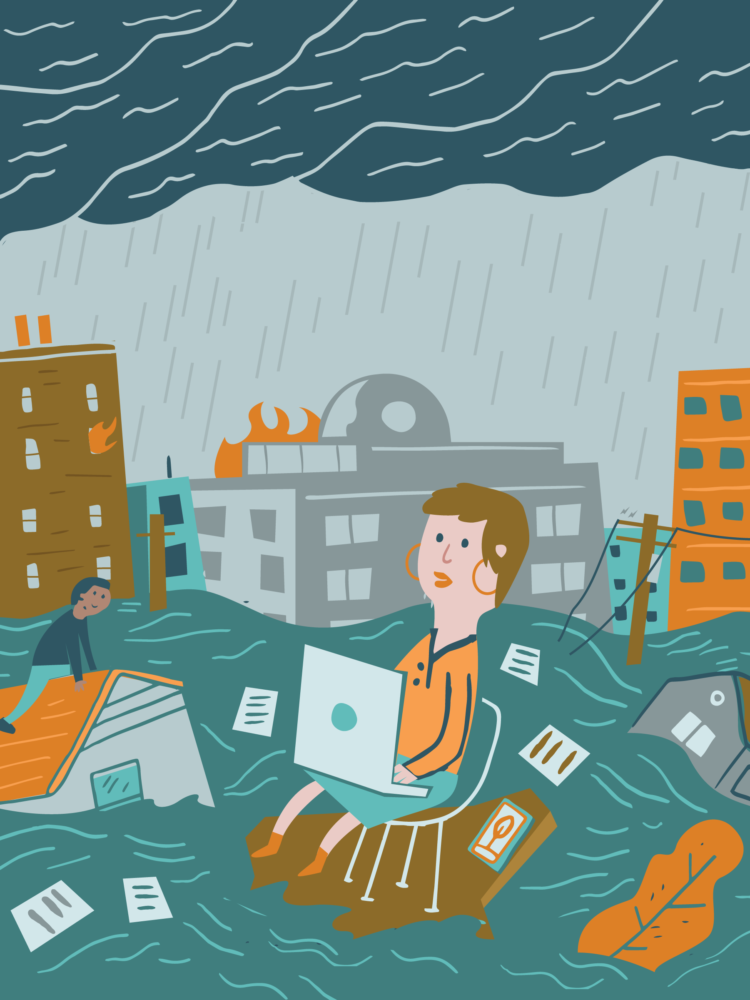In the time of my life I like to affectionately call “The Hell Years,” both of my parents were terminally ill and my husband needed major surgery that would entail a long recovery. There were innumerable doctors appointments, out-of-town trips, caretaking, and exhaustion—all while “normal” life still tromped on. We were raising a school-age son, laundry needed laundering, bills were (annoyingly) punctual, and stomachs were hungry.
Mix all that with a daily explosion of emotions ranging from sadness to fear to grief to defeat, and how the heck was I supposed to get any writing done?

‘Our hellish periods in life tend to also be time-sucks…’ Illustration by Josh Quick
I mean, I was a writer. That was my work—I had deadlines—and it was also my passion. It kept me calm.
I was slowly becoming very un-calm.
Life can throw Hefty bags full of garbage at you, sometimes one at a time and other times all at once. So while you’re trying to manage all the rubbish, how do you find the time—and the motivation—to write? And should you write? I mean, you’ve got enough going on.
Here’s what I did during those infernal, cursed, diabolical years, when I did, finally, get some writing done. I’ll admit it: some days, my fingers never touched a keyboard, and that was okay. You’ve got to recognize when something is too much. But when it was good for me to write, this is what got me going:
Write about what’s going on
I wrote articles about my parents’ illnesses, hoping that sharing our experiences might be able to help someone else. You can also journal, with no intention of ever publishing a word of it.
Or don’t write about what’s going on
Just like a good novel, writing can help you escape real life for a while. Grab some writing prompts off the internet, read a newspaper headline or two, or invent a character and go write; write about whatever interests you and is as far away from the day-to-day as possible. Sci-fi and fantasy work well; so does a nonfiction topic that’s thoroughly absorbing and requires tons of research.
Steal the time to write
Expecting a long wait in a doctor’s office? Taking the train somewhere? Bring a notebook or laptop and write whatever comes into your head. Free write or work on a project. Our hellish periods in life tend to also be time-sucks: you don’t have much extra time to do anything. Make use of all the unavoidable waiting.
Line up some deadline work
It forces you to write. You can pitch articles to editors and have them set the time frame, or enlist a friend to expect a short story from you by a certain date, and make sure they’re the kind of friend that will hold you accountable and not give you a pass just because your life stinks at the moment.
Write poetry or flash fiction or a word-limited article or a 10-minute play
If you don’t feel like you’re required to write a novel or a 20-page short story, you’re much more likely to get started.
Submit your work
Because when you get a “yes” from somewhere, it feels like a little birthday cake candle lighting up a small part of your tough world. I’m not saying to submit to The New Yorker—maybe pick some acceptance-friendly journals. And, anyway, a rejection doesn’t really make anything that much darker—how could it? You already know true wretchedness.
I became a better writer during those dark years. Why? Because that time brought me to the depths of myself. I felt emotions beyond what I’d ever known. My empathy for others deepened. And I was humbled. If things are bad, write if you can. You’ll feel seen through your words. And your readers will, too.
